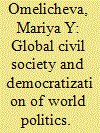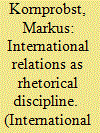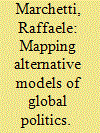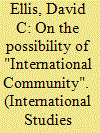| Srl | Item |
| 1 |
ID:
087330


|
|
|
|
|
| Publication |
2009.
|
| Summary/Abstract |
In the previous decade, many scholars with expertise in the politics of the Middle East pointed to an intellectual gulf between Middle East studies and mainstream international and comparative political studies. Common perceptions that the Middle East experience was too exceptional to be theory-relevant and that area studies work was excessively a-theoretical were said to be responsible for the alleged chasm. If these concerns are taken at face value, a review of research published on authoritarianism and Islamic movements in the first years of the twenty-first century in top academic presses and scholarly journals indicates that a counter trend has emerged. Middle East area experts are increasingly making use of theoretical frameworks produced by non-Middle East specialists. There is, however, variation in how well disciplinary social science analytical tools are applied and in the significance of various works to theory-building. More emphasis on theory-testing and construction (rather than just theory application) as well as cross-regional and cross-cultural comparisons will increase the comparative value of works produced by Middle East area studies specialists and will add to their visibility in the discipline at large.
|
|
|
|
|
|
|
|
|
|
|
|
|
|
|
|
| 2 |
ID:
087342


|
|
|
|
|
| Publication |
2009.
|
| Summary/Abstract |
For over a decade, scholars have been studying and debating the role and influence of non-state actors in democratizing global politics. The sheer volume of studies calls for assessing the current state of this area of research. It also invites systematic analysis of differences in the collected evidence on outcomes of the democratizing efforts of global civil society associations. In this review, I (1) expound the concept of global civil society and point to definitional dilemmas surrounding this term; (2) propose a new analytical framework for examining an association between global civil society and democratization; (3) apply the proposed framework for assessing the findings of empirical studies; (4) discuss the nature of differences and the sources of discord in the analysts' conclusions; and (5) make recommendations for advancing our knowledge in this important area of research. A principal theme that runs throughout this essay is that the field of global civil society and democratization has ample avenues for further conceptual, theoretical, and empirical work. Our ability to speak credibly of global civil society as a viable democratizing force would be improved with the development of empirical theory, conceptual elaboration, and more rigorous methodologies of research.
|
|
|
|
|
|
|
|
|
|
|
|
|
|
|
|
| 3 |
ID:
087339


|
|
|
|
|
| Publication |
2009.
|
| Summary/Abstract |
International Relations takes it all too often for granted that different scholarly sub-communities in the field are incommensurable and, therefore, that the erosion of the community of International Relations scholars is inevitable. I present a three-fold argument against this inevitability: First, International Relations is much better understood as a field of overlapping horizons than a discipline of incommensurable paradigms. Second, the most consequential overlap is epistemological. This overlap is constituted by very specific rhetorical understandings of epistemology that come remarkably close to the Aristotelian Rhetoric and Philosophical Sophistic. International Relations is a rhetorical discipline. Third, dialogue is able to seize the opportunities for communication across different horizons within and beyond International Relations-making it a lively and open discipline instead of a constellation of hermetically sealed and self-referential sub-communities.
|
|
|
|
|
|
|
|
|
|
|
|
|
|
|
|
| 4 |
ID:
087338


|
|
|
|
|
| Publication |
2009.
|
| Summary/Abstract |
The purpose of this review is to identify a framework for understanding the internationalization of ethnic conflict. We examine three approaches that purport to explain escalation-namely extension, interaction, and transformation-and emphasize the fact that each theory by itself lacks full explanatory power. Synthesis that focuses on factors from state and society, which shape the decision to become involved in ethnic strife is essential. Examination of the preceding factors reveals that institutional configurations and ethnic composition indeed do limit future options available to states and influence the distribution of capabilities among leaders of groups. The main conclusion of this essay is that ethnic diversity in a society and high constraint on state action are optimal conditions for overcoming insecurity.
|
|
|
|
|
|
|
|
|
|
|
|
|
|
|
|
| 5 |
ID:
087344


|
|
|
|
|
| Publication |
2009.
|
| Summary/Abstract |
This paper investigates the principal competing visions of global politics that are currently advanced in the public discourse about globalization in opposition to the traditional state-centered perspective. The first part of the paper develops an analysis of ideal models as cultural resources that grounds the different reading of human bonds. The second part applies the notion of ideal models to the new scenario of globalization, and identifies four alternative interpretations of the notion of global politics: namely Neo-liberalism, Cosmopolitanism, Alter-globalism, and Dialogue among Civilizations. The principal characteristics of these four notions are presented in order to map the current debate on the future of global politics.
|
|
|
|
|
|
|
|
|
|
|
|
|
|
|
|
| 6 |
ID:
087334


|
|
|
|
|
| Publication |
2009.
|
| Summary/Abstract |
The ever-widening application of "rights"-based discourse and practice worldwide raises critical research questions which comparative politics scholars are uniquely well-suited to analyze. Yet comparativists often shy away from human rights inquiry. The authors of this article explore the professional deterrents and intellectual challenges that lie behind this paradox. Drawing on their expertise on transitional justice and economic rights, they also indicate concrete ways in which the mass, scope and depth of comparative politics scholarship on human rights could be significantly increased.
|
|
|
|
|
|
|
|
|
|
|
|
|
|
|
|
| 7 |
ID:
087328


|
|
|
|
|
| Publication |
2009.
|
| Summary/Abstract |
The term "international community" has recently become commonplace in leaders' and academics' discourse and the subject of some analysis. While scholars have begun to explore its usage, there has not yet been a modern theoretical evaluation of the prerequisites for creating an international community. This article conducts a theoretical analysis on the types of international communities that can be generated in international politics and the structural factors necessary for their manifestation. It continues by investigating the possibility of forming a unitary actor, called the "International Community," tasked with resolving global commons issues through an international organization, such as the United Nations. The article concludes by arguing that the conditions do not yet exist for a meaningful "International Community."
|
|
|
|
|
|
|
|
|
|
|
|
|
|
|
|